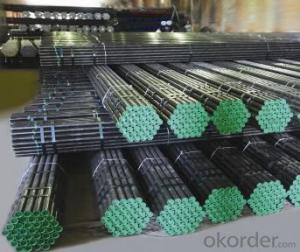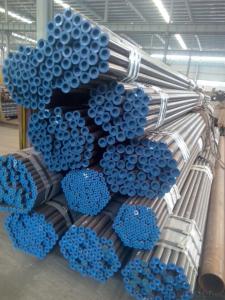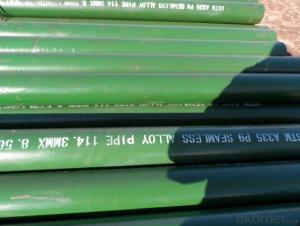Steel pipe A335P9 18-267
- Loading Port:
- China Main Port
- Payment Terms:
- TT OR LC
- Min Order Qty:
- -
- Supply Capability:
- 200T m.t./month
OKorder Service Pledge
OKorder Financial Service
You Might Also Like
A335P9 Steel pipe The standing stock of specifications
A335P9 Steel pipe 70*4.5-5-6-7-8-9-10-12-15-16
A335P9 Steel pipe 245*8-10-14-17-20 -22-30-40
P5 C≤0.15 Mn 0.3-0.6 P ≤0.25 S≤0.25
Si 0.25-1.0 Cr 8-10 Mo 0.9-1.1
Alloy pipe is a steel pipe according to the production materials (i.e. material) to define, just as its name implies is made of alloy steel seamless pipe; and is in accordance with the production process (seamed seamless) to define, seamed pipe seamless pipe is different from, including straight seam welded pipe and spiral tube.
Manufacturing process
1 hot-rolled (extrusion seamless pipe): billet, heating, perforation, three roll cross rolling, rolling or extrusion, tube off, sizing pipe (or reducing), cooling, straightening, water pressure test (or testing), marking, storage
2 cold drawing (rolling) seamless steel pipe: billet, heating, perforation, heading, annealing, pickling, oiling round tube (copper) and multi pass drawing (Leng Zha), the blank pipe, heat treatment, straightening, water pressure test (testing), marking, storage
[(diameter - thickness) * wall thickness of]*0.02466=kg/ meters (per metre weight)
Alloy pipe use
Alloy pipe for low and medium pressure boiler (work pressure is generally not more than 5.88Mpa, the operating temperature at 450 DEG C) of the heating surface tube; used for high pressure boiler (work pressure is generally above 9.8Mpa, operate at a temperature of 450 DEG to 650 DEG C between) the heating surface tubes, economizer, superheater, reheater, petrochemical industry uses the tube and so on.
- Q:What are the different coating options available for steel pipes?
- Some of the different coating options available for steel pipes include epoxy coatings, polyurethane coatings, fusion-bonded epoxy coatings, zinc coatings, and asphalt coatings.
- Q:What are the different types of steel pipe connections?
- There are several types of steel pipe connections, including threaded connections, welded connections, flanged connections, and grooved connections.
- Q:Can steel pipes be used for gas lines?
- Yes, steel pipes can be used for gas lines. They are commonly used due to their strength, durability, and resistance to high pressure and corrosion. However, it is important to ensure that the steel pipes are specifically designed and certified for use with gas to ensure safety and compliance with industry standards.
- Q:What is the thermal expansion coefficient of steel pipes?
- The thermal expansion coefficient of steel pipes varies depending on the specific type of steel used, as well as the temperature range in which the expansion is being measured. However, on average, the thermal expansion coefficient of steel pipes ranges from 10-14 x 10^-6 per degree Celsius (10-14 μm/m°C). This means that for every degree Celsius increase in temperature, the length of a steel pipe will expand by approximately 10-14 μm per meter of length. It is important to note that this value is an average and can vary slightly depending on the specific composition and treatment of the steel used in the pipe.
- Q:How are steel pipes used in the manufacturing of furniture?
- Steel pipes are commonly used in the manufacturing of furniture to provide structural support, such as in the construction of chair and table frames. They are also used as a base for attaching other materials, such as wood or fabric, and can be bent, shaped, and welded to create various designs and styles.
- Q:Which is more load-bearing, the same thickness of steel pipe and steel bar?
- The magnitude of the axial force acting on the steel member is only related to three factors, namely, the strength of the material, the sectional area of A and the longitudinal stability factor of F.
- Q:How are steel pipes tested for leakage?
- Steel pipes are tested for leakage using various methods, including hydrostatic testing, pneumatic testing, and ultrasonic testing. Hydrostatic testing involves filling the pipe with water or another liquid and subjecting it to high pressure to check for any leaks. Pneumatic testing, on the other hand, involves pressurizing the pipe with air or gas to detect any leakage. Ultrasonic testing utilizes sound waves to identify any defects or leaks in the pipe by measuring the time it takes for the sound waves to bounce back. These testing methods ensure that steel pipes meet the required standards and are free from any leakage.
- Q:How to identify stainless steel pipe and steel pipe?
- The welded pipe is rolled into the steel tubular to sew or spiral seam welded in the manufacturing method, and is divided into low pressure fluid delivery with welded steel pipe, spiral welded steel pipe, welded steel pipe, welded pipe roll etc.. Seamless steel pipe can be used in various industries, such as liquid, pneumatic, pipeline and gas pipeline. Welding pipes can be used in water pipelines, gas pipelines, heating pipes, electrical appliances, pipelines and so on.
- Q:Can steel pipes be used for underground fuel storage tanks?
- Yes, steel pipes can be used for underground fuel storage tanks. Steel pipes are commonly used for various applications, including underground storage tanks for fuel. They are strong, durable, and resistant to corrosion, making them suitable for long-term storage of fuels such as gasoline, diesel, and oil. Additionally, steel pipes can be easily welded together to create a seamless and secure tank structure. However, it is important to ensure that the steel pipes used for underground fuel storage tanks are properly coated with corrosion-resistant materials to protect them from any potential damage caused by exposure to moisture or the chemicals present in the fuel. Regular inspection and maintenance are also necessary to ensure the integrity of the tank and prevent any leaks or environmental hazards.
- Q:What are the common uses of stainless steel pipes?
- Stainless steel pipes are widely used in various industries for a multitude of applications. Some of the common uses of stainless steel pipes include: 1. Plumbing and Water Supply: Stainless steel pipes are often used in residential, commercial, and industrial plumbing systems due to their corrosion resistance, durability, and ability to handle high-pressure applications. They are also used in water treatment plants and wastewater management systems. 2. Oil and Gas Industry: Stainless steel pipes are extensively used in the oil and gas industry for transporting oil, gas, and other fluids. They can withstand high temperatures, pressure, and corrosive environments, making them ideal for this industry. 3. Food and Beverage Industry: Stainless steel pipes are widely used in the food and beverage industry due to their hygienic properties and resistance to corrosion. They are commonly used for transporting liquids, gases, and food products in processing plants, breweries, wineries, dairies, and other food-related facilities. 4. Chemical and Petrochemical Industry: Stainless steel pipes are critical in the chemical and petrochemical industry, where they are used for transporting corrosive chemicals, acids, and other hazardous substances. The pipes' resistance to corrosion and high temperatures makes them suitable for these demanding applications. 5. Construction and Architecture: Stainless steel pipes are used in construction and architecture for various purposes such as structural support, handrails, guardrails, and decorative elements. Their strength, durability, and aesthetic appeal make them a popular choice in modern architectural designs. 6. Automotive and Transportation: Stainless steel pipes are used in the automotive industry for exhaust systems, fuel lines, and other components that require resistance to high temperatures and corrosion. They are also used in the transportation of fluids and gases in ships, trains, and airplanes. 7. Pharmaceutical Industry: The pharmaceutical industry requires high-quality materials that meet stringent sanitary standards. Stainless steel pipes are commonly used in pharmaceutical manufacturing processes for transporting liquids, gases, and chemicals due to their cleanability, corrosion resistance, and compatibility with pharmaceutical products. 8. Power Generation: Stainless steel pipes are used in power plants, both conventional and renewable, for various applications such as steam lines, condensers, and heat exchangers. They are chosen for their ability to withstand high temperatures, pressure, and corrosive environments. In summary, stainless steel pipes find applications in a wide range of industries including plumbing, oil and gas, food and beverage, chemical and petrochemical, construction, automotive, pharmaceutical, and power generation. Their corrosion resistance, durability, and ability to handle high temperatures and pressure make them a versatile and reliable choice for various industrial applications.
1. Manufacturer Overview |
|
|---|---|
| Location | |
| Year Established | |
| Annual Output Value | |
| Main Markets | |
| Company Certifications | |
2. Manufacturer Certificates |
|
|---|---|
| a) Certification Name | |
| Range | |
| Reference | |
| Validity Period | |
3. Manufacturer Capability |
|
|---|---|
| a)Trade Capacity | |
| Nearest Port | |
| Export Percentage | |
| No.of Employees in Trade Department | |
| Language Spoken: | |
| b)Factory Information | |
| Factory Size: | |
| No. of Production Lines | |
| Contract Manufacturing | |
| Product Price Range | |
Send your message to us
Steel pipe A335P9 18-267
- Loading Port:
- China Main Port
- Payment Terms:
- TT OR LC
- Min Order Qty:
- -
- Supply Capability:
- 200T m.t./month
OKorder Service Pledge
OKorder Financial Service
Similar products
New products
Hot products
Related keywords






























